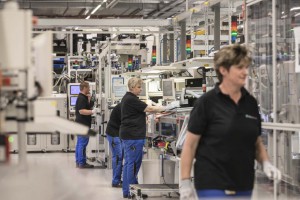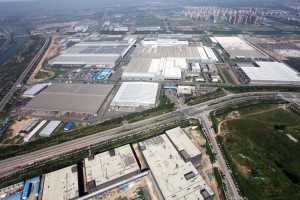
Daimler AG is partnering with BAIC to ramp up its electric vehicle production in China, which is pushing for more "new energy vehicles."
Daimler AG and BAIC Motor Corp., its Chinese joint venture partner, plan to invest the equivalent of $735 million to boost production of electric vehicles in China, part of the German carmaker’s broader push into electrified vehicles.
The move comes, at least in part, under pressure from the Chinese government which is pushing automakers to shift from traditional gasoline engines to battery power to help reduce the country’s endemic smog problems.
China is already the world’s single-largest market for plug-based vehicles, passing the United States two years ago. And, “By 2025, the Chinese market will have a substantial share in global sales of Mercedes-Benz electric vehicles,” said management board member Hubertus Troska in a statement issued by Daimler on Wednesday.
There are a number of components to the new investment by Daimler and BAIC. The most significant covers the creation of a new battery factory that will be operated by the joint venture Beijing Benz Automotive Co., Ltd.
(Ministers eye pushing global EV sales to 30% by 2030. Click Here for the story.)
The latest announcement comes just a month after Daimler and BAIC approved a framework agreement that will see them upgrade an existing Beijing Benz plant to produce a variety of so-called “New Energy Vehicles.” That is expected to include a mix of conventional hybrids, plug-in hybrids and pure battery-electric vehicles, or BEVs.
“Building another premium eBattery factory is the next step in the implementation of our electric strategy. Thus, we have the first foreign location in our global battery production network. The local production of batteries is crucial in order to meet the demand for electric vehicles flexibly and efficiently,” said Markus Schäfer, Member of the Divisional Board of Mercedes-Benz Cars, Production and Supply Chain.
Like other German manufacturers, Daimler long had focused on conventional gas and diesel powertrain technologies. But it has launched a dramatic – and costly – shift to cleaner propulsion systems, in part driven by increasingly stringent global emissions and fuel efficiency mandates.
(Click Here to see more about Daimler’s new $1.15 billion EV battery plant.)
China has put into place some of the toughest guidelines as it attempts to resolve worsening pollution problems that have been choking cities such as Beijing and Shanghai. A number of major cities already have enacted monthly limits on new vehicle registrations, though qualified New Energy Vehicles are exempted.
For its part, Daimler is pushing into battery technology worldwide. Among other recent steps, the carmaker has announced plans to create the new Mercedes-EQ brand specifically focused on battery vehicles like the EQ prototype unveiled at the 2016 Paris Motor Show.
“We attach high priority to responsible mobility across the entire value chain,” Daimler board member and research chief Ola Kallenius said earlier this year. “We are continuing to systematically promote the issue of sustainability through targeted investments in environmental projects in the development and production of our vehicles.”
(To see more about Daimler’s new plant in Russia, Click Here.)
For his part, Daimler CEO Dieter Zetsche said the goal is to have at least 10 fully electric models in production by 2022 – three years ahead of earlier targets – a project the maker estimated will cost it $11 billion.

